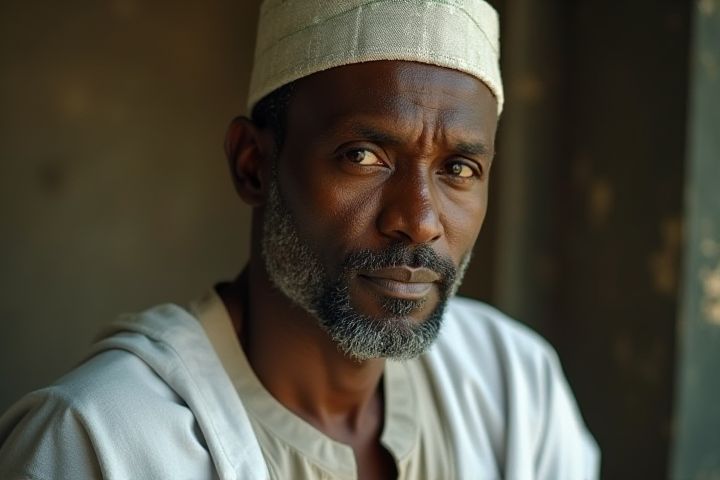
Nigeria is experiencing a complex blend of challenges and progress in various sectors. Economically, it ranks as Africa's largest economy, benefiting from its extensive natural resources, particularly oil and gas, while also grappling with inflation and unemployment issues. Socially, the country faces heightened security concerns due to conflicts with insurgent groups and ethnic tensions, impacting overall stability. However, you may notice advancements in technology and entrepreneurship, particularly in the fintech sector, which are fostering innovation and growth among the youth. Politically, ongoing reforms and election processes suggest a commitment to improving governance, although issues of corruption and inefficiency persist.
Economic growth rates
Nigeria's economic growth rate has shown fluctuations, reflecting a complex interplay of factors such as oil prices, agriculture, and government policies. The International Monetary Fund (IMF) projects a modest growth rate, suggesting a gradual recovery from previous recessions influenced by declining oil revenues and global economic shifts. The nation's efforts in diversifying the economy, particularly through investments in technology and agriculture, aim to bolster resilience against external shocks. You can observe indicators like GDP growth and inflation rates to gauge the overall economic trajectory and challenges currently faced.
Inflation and cost of living
Nigeria is currently facing significant challenges with inflation, which has reached alarming rates, affecting the cost of living for many citizens. In 2023, the inflation rate in Nigeria surged to over 20%, driven by rising food prices and a devaluation of the naira. This economic pressure has made essential goods increasingly unaffordable for the average household, leading to a decline in overall living standards. You may find that these economic factors contribute to growing discontent among the populace, raising concerns about the long-term stability of the nation's economy.
Corruption levels
Nigeria continues to grapple with significant levels of corruption, impacting various sectors, including governance, education, and healthcare. Recent reports indicate a mixed response to anti-corruption measures, with some improvements in transparency initiatives and the strengthening of institutions, yet persistent challenges remain. While the government has made commitments to tackle corrupt practices, public perception often suggests that corruption remains deeply entrenched in political and economic systems. This ongoing struggle highlights the need for sustained efforts to promote accountability and reduce the influence of corrupt activities in Nigeria.
Security and terrorism
Nigeria's security situation remains critical, with ongoing challenges from terrorism and violent extremism, particularly in the northeastern regions. Groups like Boko Haram and its offshoot, the Islamic State West Africa Province (ISWAP), continue to inflict harm on civilians, disrupting efforts towards stability and development. While the Nigerian government has implemented various military strategies and community engagement initiatives, the effectiveness of these measures varies widely across different regions. Your awareness of these issues can contribute to informed discussions about potential solutions and support for affected communities.
Unemployment rates
Nigeria's unemployment rate has reached alarming levels, with recent statistics indicating that it hovers around 33%. This situation has particularly affected youth, where more than half of the population under 30 is currently unemployed. Factors such as economic downturns, security challenges, and inadequate educational systems contribute to the persistent job scarcity. Addressing these issues is crucial for improving job creation and fostering economic stability in the nation.
Healthcare system improvements
Nigeria's healthcare system has experienced significant improvements in recent years, driven by increased government funding and the implementation of the National Health Act. The establishment of Primary Healthcare Centers aims to enhance access to essential medical services and address prevalent health challenges such as maternal and child mortality. Initiatives like the Integrated Disease Surveillance and Response program are strengthening disease prevention and control efforts across the nation. By prioritizing public health initiatives and fostering partnerships with international organizations, Nigeria is working towards a more resilient healthcare system that benefits its citizens.
Education sector development
Nigeria's education sector has seen both advancements and challenges in recent years. Initiatives such as the Universal Basic Education (UBE) program aim to enhance access to quality education, particularly in rural areas where enrollment rates are traditionally low. However, issues like inadequate funding, teacher shortages, and overcrowded classrooms continue to hinder progress. You can observe improvements in digital learning initiatives and partnerships with private organizations, reflecting a growing emphasis on modernizing educational infrastructure and increasing overall literacy rates.
Infrastructure investments
Nigeria's infrastructure investments have shown signs of improvement, with significant funding directed towards transportation, energy, and urban development projects. The ongoing construction of roads, bridges, and rail systems is aimed at enhancing connectivity and fostering economic growth. Renewable energy initiatives are gaining traction, seeking to address power supply challenges and promote sustainable development. You can observe that despite these advancements, challenges remain, including funding gaps and maintenance issues that hinder overall progress.
Political stability
Nigeria's political stability has shown signs of improvement in recent years, marked by the peaceful handover of power in national elections. However, the persistence of ethnic tensions and regional conflicts continues to challenge governance efforts. The government's commitment to anti-corruption measures and economic reforms has garnered some international support, aiding in restoring public confidence. Despite these advancements, ongoing security concerns and civil unrest remain barriers to achieving long-term political stability in the country.
Human rights and freedom
In recent years, Nigeria has faced significant challenges in the realm of human rights and freedom, with ongoing reports of police brutality, restrictions on freedom of speech, and the persecution of activists. The End SARS movement in 2020 highlighted citizens' demand for better governance and accountability from security forces, marking a pivotal moment in the fight for human rights. While there have been some governmental promises for reform, systemic issues and widespread impunity for human rights violations persist, raising concerns among international organizations and human rights advocates. Your awareness and engagement in these issues can contribute to a global dialogue aimed at improving the human rights landscape in Nigeria.
